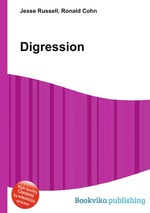Digression
Jesse Russell Ronald Cohn
бумажная книга
High Quality Content by WIKIPEDIA articles! Digression (parekbasis in Greek, egressio, digressio and excursion in Latin) is a section of a composition or speech that is an intentional change of subject. In Classical rhetoric since Corax of Syracuse, especially in Institutio Oratoria of Quintilian, the digression was a regular part of any oration or composition. (An oratorical discourse should have five sections: prelude, narration, argumentation, digression and conclusion. But, the place of digression is not fixed, so it can come before or after argumentation). After setting out the topic of a work and establishing the need for attention to be given, the speaker or author would digress to a seemingly disconnected subject before returning to a development of the composition`s theme, a proof of its validity, and a conclusion. This use of the digression is still noticeable in many sermons: after the topic, the speaker will introduce a "story" that seems to be unrelated, return to the subject, and then reveal how the story illustrates the speaker`s point. A schizothemia is a digression by means of a long reminiscence. Cicero was a master of digression, particularly in his ability to shift from the specific question or issue at hand (the hypothesis) to the more general issue or question that it depended upon (the thesis). As was the case with most ancient orators, Cicero`s apparent digression always turned out to bear directly upon the issue at hand. During the Second Sophist (in Imperial Rome), the ability to guide a speech away from a stated theme and then back again with grace and skill came to be a mark of true eloquence.


